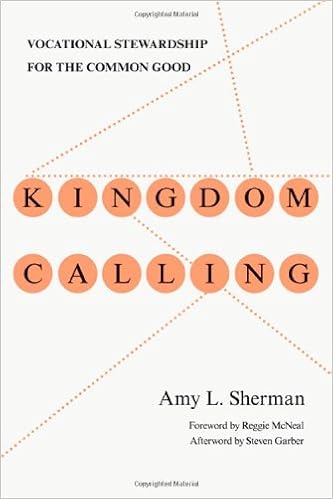
What are some features of the coming Kingdom?
Amy L. Sherman in her phenomenal book Kingdom
Calling: Vocational Stewardship for the Common Good with a section on What Does
the Rejoiced City Look Like. This
chapter examines the biblical aims of justice, shalom, peace, restoration,
unity, and health. We get a glimpse or
foretaste of the coming kingdom in the book of Zechariah, specifically chapter
8, verses 16-17. God reminds his people
Israel of their obligation to do justice but also to treat each other not out
of evil motives in their hearts but to do them well. The text reads,
“These are the things that you shall do: Speak
the truth to one another; render in your gates judgments that are true and make
for peace; 17 do not devise evil in your hearts against one another, and love
no false oath, for all these things I hate, declares the Lord.”
Three things are evident here in the Lord’s
words to fallen Israel:
Personal
holiness toward the other – The first mention of action
is “Speak truth to one another.” The
occasion for falsehoods and lies is the occasion for the destruction of a
people. The focus is personal because
all sin has ramifications and consequences for the other people, but speaking
lies starts with each person. If there
is a mutual trust between persons, including God and his people, then the
conditions are right for flourishing.
Falsehood breeds insecurity, hiding from others, and reeks of shame,
shame that brings judgment.
Local
holiness – The mention of gates refers to the community
of the faithful, the place where law courts and judgement would be
pronounced. There is past record of
Israel recording unjust judgments against its people, and anyone who would seek
a fair sentence. Judgements that are
true are those which are in right accordance with the state of events that took
place but also that pursue peace. The peace
here is shalom, both a flourishing for humanity and the entire created
order.
Holiness
of the good – Lastly, devising evil in one’s
heart is purposive with a specific intent to tear down the reputation,
character, and good of another person.
Rather than seeking to ruin another person by action and word, doing
good to them is part of God’s goal for human flourishing. We must be aware that our hearts are prone to
do evil, that it is in our devices that we do harm to others. Forgiveness lies at the door for us because
of the savior, but this does not mean that still don’t fall into the clutches
of evil devices.
Why are these three things connected in Zechariah 8.16-17? For one, personal holiness is not set up against local or community holiness. The very actions of individuals affect the lives of everyone around them, therefore, one person’s holiness is a matter of great concern. Yet, we know that many people acting on behalf of others, for their good, goes a long way in promoting the good, curbing evil devices, and bringing health to the city. There is no dualism here. God is concerned with the holiness of every believer, the holiness of every community, and the holiness of every nation.
Comments
Post a Comment